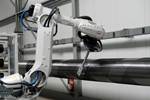MVP partners with LestaUSA to bring robotics to composites
Self-learning robotic solutions are designed to simplify the automation process for composites manufacturers of all sizes wanting to incorporate automated spray applications.
Robot chopper sprayup. Source | Magnum Venus Products (MVP)
Magnum Venus Products (MVP, Knoxville, Tenn., U.S.), a manufacturer of fluid movement and production solutions, announces its strategic partnership with (Tea, S.D., U.S.) to be the exclusive provider of Lesta’s robotic solutions to the composites industry. This partnership aims to bridge the automation gap for manufacturers by providing accessible, efficient and innovative robotic solutions when applying liquid, powder or fiberglass on metal, wood or composite materials.
In the evolving landscape of composites manufacturing, traditional robotic technology has presented challenges, often requiring complex programming, specialized software and substantial investments. However, Lesta’s self-learning robots are said to offer an alternative — with no advanced programming required, they streamline the integration process, enabling manufacturers to start producing robotically within a day of installation.
“By combining MVP’s knowledge in the composites industry and Lesta’s robotic solutions, we can overcome the challenges that have plagued many of our customers from being able to successfully incorporate automated spray applications,” notes Scott Andrews, VP of commercialization at MVP. “This collaboration aligns perfectly with our product development strategy, which focuses on addressing workforce challenges and providing scalable automation solutions. The ability to teach a robot the trade skill of a customer’s best operator ensures success and significantly enhances operational efficiency.”
The hallmark of Lesta self-learning technology lies in its simplicity and adaptability. Enabling the operator to teach the robot directly in a weightless self-learning mode results in precise control over every aspect of production. From gun angles to trigger pulls, speed and spray technique, operators can fine-tune processes. Furthermore, multiple recipes can be recorded in real-time and saved for future use, ensuring consistent and high-quality outputs.
Related Content
-
How AI is improving composites operations and factory sustainability
Workforce pain points and various logistical challenges are putting operations resilience and flexibility to the test, but Industry 4.0 advancements could be the key to composites manufacturers’ transformation.
-
Flyber launches U.K. composites manufacturing site for advanced mobility applications
The startup’s design automation and composite material layup and curing technologies target lightweighting for aerospace, UAVs, eVTOL and high-performance mobility platforms.
-
Laser cleaning in composites manufacturing
Laser cleaning technologies for cleaning production molds for composites offer alternatives to harsher, less-friendly methods with features like automation and higher power cleaning.



